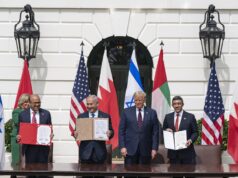Now that the first blast of hot air is gone, it may be possible to discuss l’Affaire Khashoggi rationally. First, the stipulations:
- Jamal Khashoggi should not have been killed. Period.
- In the longer form, that stipulation reads that no one should be killed by governments that disapprove of what they say, write, or think. That applies to Saudi Arabia, but also to Russia, Turkey, Iran and China, and others, all of which have dispatched their enemies to far less fanfare. [By the way, where is Interpol President Meng Hongwei who disappeared on a visit to China from his home in France in early October?]
- Turkey is not a reliable source of information on Saudi Arabia. Its animosity goes back centuries.
- The United States is not responsible for Kashoggi’s death, as The Washington Post more than implied. It is not the judge and jury of his killers and was not in a position to protect a man moving between two other countries. Righteous anger is not a call to war.
If Lord Palmerston was right about friends and interests, then it is American interests for which President Trump along with Congress is responsible.
In the cauldron of the Middle East, America’s essential security interest is to prevent Iranian expansion into and weaponization of other countries.
Iran’s nuclear program does not stand apart from the Mullah’s Shiite hegemonic intentions, it underpins them. Whatever hope America has for religious tolerance, free expression, women’s rights, minority rights, loyal opposition, and so on in the region, they cannot succeed if the Islamic Republic does. Iran is the fountain of evil in the Middle East, with tentacles that go as far afield as Venezuela.
It is in the American interest to ensure freedom of navigation in the Red Sea and in the Persian Gulf.
The first priority is Iran’s war in Yemen. NOT the “Saudi war in Yemen,” as it has been characterized in the media (here, here, here, and here for just a few examples). Iran is aiming for a military position in the heel of Arabia from which it could close the narrow Bab el Mandeb Straits. Israel, Jordan, Saudi Arabia, and Egypt – America’s allies – would lose their Red Sea exit to the Gulf of Aden and the Indian Ocean. And the American base in Djibouti – our only one in Africa – would have Iranians at the door. Iran has already claimed the Red Sea is not safe for the U.S. Navy. The Navy responded that it will defend freedom of navigation both there and in the Persian Gulf, and to that end has been conducting military exercises in both.
It is in the American interest not to allow Iran to reach the Mediterranean Sea overland.
The second priority is Iran’s war in Syria. If closing the Red Sea to American allies is important to Iran, equally important is establishing a permanent presence in Syria along the land route to the Mediterranean Sea. Known as the “Shiite Crescent,” the route Iran seeks traverses Iraq, Syria and Lebanon, putting a “lid” on Saudi Arabia, Jordan, and Israel in the north. The U.S. military position in Syria is to prevent that.
It is in the American interest to have the Arab states accept Israel as a legitimate, permanent presence in the Middle East.
Third is Iran’s subversion of the Sunni Gulf States. Here, Israel plays in interesting and increasingly important role. The burgeoning relationship between Israel and the Arab States is based not on friendship but on a realistic appraisal of the risks to the region posed by Iran.
Last week’s meetings between Prime Minister Benjamin Netanyahu and the Sultan of Oman, in Oman, refute the assumption that Israel’s only partner in the Persian Gulf was Crown Prince Mohammad bin Sultan (MbS). Unlike other Israeli visits to the region, this one wasn’t a secret; the Sultanate supplied video. Israeli Minister Miri Regev was in Abu Dhabi Monday and Minister Yitzhak Katz’s will be in Oman later this week.
Omani Foreign Minister Yousuf bin Alawi bin Abdullah told a security meeting in Bahrain. “Israel is a state present in the region and we all understand this…Maybe it is time for Israel to be treated the same [as others states]…”
It is in the American interest to reject simplistic tropes about Sunnis and Shiites and to build a realistic understanding of the cross-currents among its present adversaries.
The cross-pollination of Iran and Qatar with Turkey and Hamas is counterintuitive for Americans who believe the Sunni-Shiite divide is the only one that matters. It is not. Persian Iran and Aryan Turkey have fought Arabs for centuries. They are both expansionist and have been at odds with each other as well as with Arabs – but they find a common interest now in the discomfiture of the Christian West and its Jewish partner.
Turkey takes the side of the Muslim Brotherhood in its fight against both Saudi Arabia and Egypt. It has allies in Shiite Iran and Shiite Qatar, the latter of which has made major investments in Turkey to offset the collapsing lira. Qatar also finances Sunni Muslim Brotherhood Hamas. Iran finances Sunni jihad in Africa and socialist Venezuela.
The U.S. needs to account for that cross-pollination.
It is in the American interest to follow Lord Palmerston through a particularly messy part of the world.





